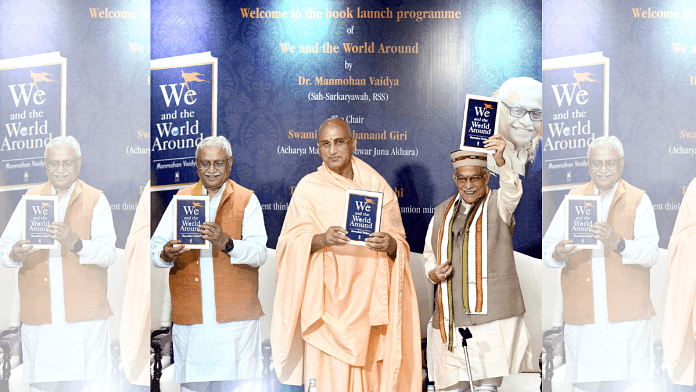New Delhi: An invitation to former president Pranab Mukherjee to speak at an annual Rashtriya Swayamsevak Sangh (RSS) event in Nagpur in 2018 triggered a controversy. It also motivated Sangh joint general secretary Manmohan Vaidya to take to writing.
Now, five years later, speaking at the Dr Ambedkar International Centre in Delhi at the launch of We and the World Around, a collection of his articles, Vaidya Thursday said, “In 2018, during the conclusion of the Sangh Shiksha Varg, Pranab Mukherjee was invited as a speaker but faced significant opposition, even though he wasn’t joining the RSS, just speaking as a guest.”
“This unnecessary opposition triggered me to write an article. It also revealed the attitude of the liberal crowd, as RSS traditions involve inviting various people from outside,” he said.
Vaidya pointed out that the furore eventually helped the RSS, as the number of requests to join the organisation increased nearly six-fold on the day Mukherjee spoke at the event.
“Otherisation is not an Indian idea. This is why, the opposition Pranab da faced was not in line with Indian values. Fanaticism starts with the idea of ‘only me, not others’. To understand the RSS, it’s essential to understand India,” Vaidya said.
Expanding on the concept of his book which talks about India and its position in the world, Vaidya said that the welfare state was never an Indian concept, as pointed out by Rabindranath Tagore (in his essays). Unlike the West’s nation-state model, India has always been self-reliant, he said.
“Matters such as judiciary, foreign affairs, security and defence were under the king’s purview, while education, health, temples, and trade operated within their own societal systems. Society managed these aspects collectively. India has always been self-sufficient and not reliant on the state, unlike the West’s nation-state model,” Vaidya said.
“India’s people went across the world but they did not establish colonies, did not loot others, did not convert, which the Arabs and Europeans did. This reflects India’s distinct philosophy. As Tagore pointed out, the concept of a welfare state was never part of India’s heritage,” he added.
Those who are conservative and intolerant do not represent Indian values, he said.
“To understand India, they must become more Indian. Tagore emphasised the importance of consciously, actively, and completely becoming what we are. The world desires India in this way, yet it denies itself and those who reject this idea are labelled as intellectuals,” he stated.
‘No Israeli Muslim supports Hamas, Indians do’
Talking about the prevailing situation in the world, Swami Avdheshanand Giri of Juna Akhada, who presided over the programme, said that Israel has 17 lakh Muslims standing with their nation, while here (in India), some people support Hamas. Among the 20 percent Muslim population in Israel, not even one person aligns with Hamas, but there are individuals who sympathise with them in India.
“India is unique because it is deeply rooted in its traditions and values. India is not just a geographical region; it represents a set of beliefs and traditions, not just a landmass. In future, if AI seeks authenticity and completeness, it too will find refuge in the teachings of the Upanishads,” he said.
Senior BJP leader Murali Manohar Joshi talked about the distinction in the concept of ‘We’ in India and the western world. He pointed out how the West is struggling with its identity.
“In a turbulent and highly violent world, filled with fanaticism and fundamentalism, peace seems elusive, and everything appears chaotic and disordered. This raises a question for Americans and Europeans: ‘Who are we?'”
“Americans might simplify it by saying that if you’re white, of Anglo-Saxon descent, and Protestant, you belong. They have sent marginalised individuals to other countries. While they themselves become American citizens, they don’t quite feel like they truly belong to America,” Joshi said.
(Edited by Smriti Sinha)
Also read: Akhand Bharat to warning against ‘woke’ forces — Mohan Bhagwat’s Vijayadashami speeches over 9 yrs



